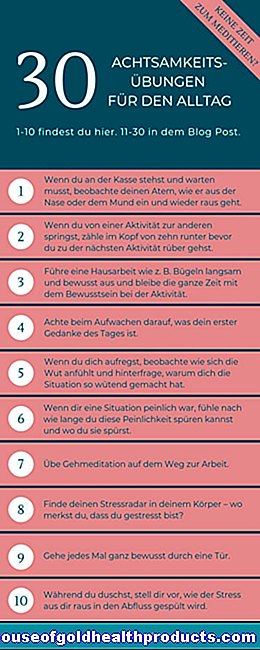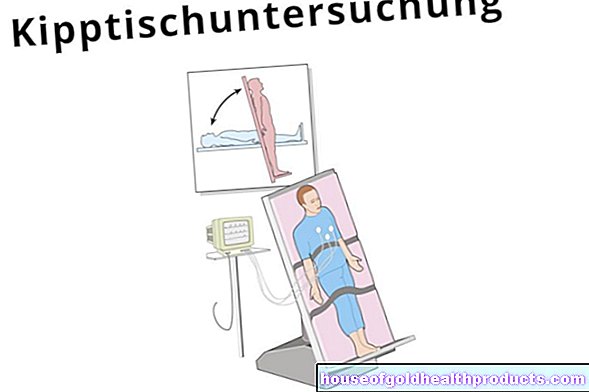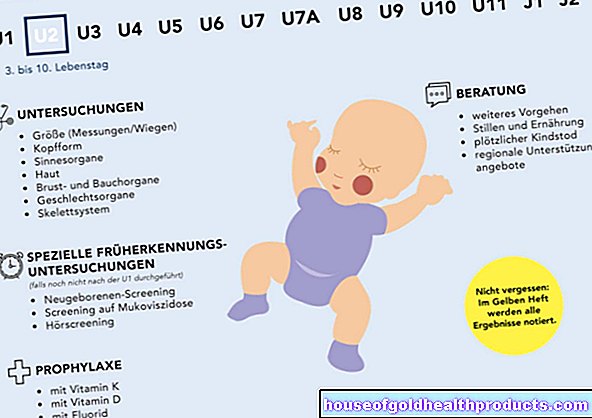Dementia: Danger from sleeping pills & Co.
All content is checked by medical journalists.Common drugs for incontinence, sleep disorders or depression, for example, can have dramatic side effects: in higher doses or when used for longer periods of time, they seem to increase the likelihood of dementia - even after they have long been discontinued.
Insomnia, depressed mood, an overactive bladder or allergies (such as hay fever) - the list of diseases in which anticholinergic agents are used is long. Because the medicinal substances have a great advantage: They block the action of the neurotransmitter acetylcholine in the brain, which generally has a calming and relaxing effect. However, the site of action also has its downsides - a connection between the use of drugs with an anticholinergic effect and the occurrence of dementia has been known for a long time.
So far, experts have assumed that the known impairment of cognitive performance caused by anticholinergics is reversible, i.e. disappears again after discontinuation of the preparations. However, a new study provides indications that this may not be the case.
Elderly patients in the study focus
For this study, researchers from the University of Washington tracked the health of 3,434 people aged 65 or older for an average of more than seven years. The choice fell on older participants because it is precisely them who often take anticholinergic agents regularly and over long periods of time. At the start of the study, none of the subjects showed signs of dementia. In the course of the study period, however, this was diagnosed in 797 participants: Most of them developed Alzheimer's disease, the rest of them from another form of dementia.
Now the researchers determined what total amounts of anticholinergic active ingredients (prescription and over-the-counter) the study participants had taken during the observation period. They used the records in the databases of pharmacies. Most often, participants had taken anticholinergic agents in the form of certain sleeping pills (such as diphenhydramine), anti-bladder drugs (such as oxybutynin), and tricyclic antidepressants (such as doxepin).
The risk increases with the amount of active ingredient
The evaluation of the data showed: There was an increased risk of dementia for those test persons who had taken at least 10 milligrams of doxepin, 4 milligrams of diphenhydramine or 5 milligrams of oxybutynin daily for a period of more than three years - dosages that are quite common or even in practice be crossed, be exceeded, be passed. For example, Doxepin is prescribed in an initial dose of 25 to 50 milligrams for depression. This dose can then be increased to a maximum of 300 milligrams per day.
According to the study, the increase in the risk of dementia increased with the total dose of anticholinergic agents. Participants with the highest consumption had a 54 percent increased risk of dementia.
Check medication
The study director Dr. Shelly Gray stresses, however, that despite these results, no one should stop taking anticholinergic drugs on their own. Rather, one should speak to the attending physician: Some anticholinergic drugs are relatively easy to replace with others for which there is no known increased risk of dementia. For example, tricyclic antidepressants such as doxepin could be replaced by so-called SSRIs such as citalopram or fluoxetine, says Dr. Gray.
The researcher advises doctors to prescribe anticholinergic drugs - if they are absolutely necessary at all - in the lowest possible dose, to regularly check the success of the therapy and to stop treatment if the drugs do not show the desired effect.
Further studies needed
Even if the available study results suggest that anticholinergic agents can be causally involved in the development of dementia - this has not yet been proven with this observational study. Experts from the British Alzheimer's Society, for example, therefore advocate investigating the connection more closely. (mf)
Sources:
Gray, S.L. et al .: Cumulative Use of Strong Anticholinergics and Incident Dementia, JAMA Intern Med., doi: 10.1001 / jamainternmed.2014.7663
Press release from the University of Washington School of Pharmacy: Higher dementia risk linked to more use of common drugs
S3 guideline / National Care Guideline for Unipolar Depression (as of 2012)
Alzheimer's Society: www.alzheimers.org.uk (accessed: January 29, 2015)
Tags: Baby Child tcm sex partnership





























